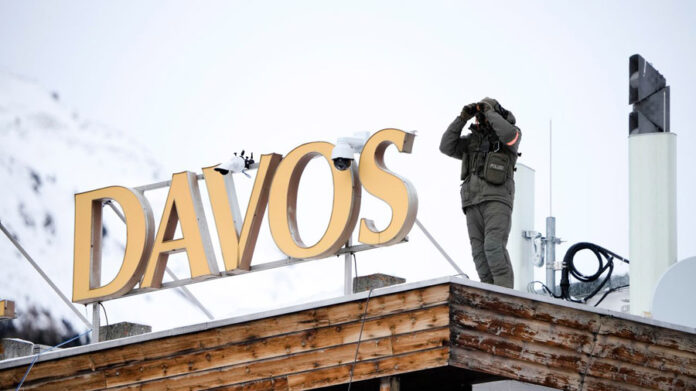From January 16 to 20, the annual meeting of the World Economic Forum took place in Davos in the Swiss Alps. At the heart of the meeting was the word “polycrisis”. A word used by the participants to describe the threats and risks currently facing the global economy.
The founder and executive chairman of the World Economic Forum, Klaus Schwab, said shortly before the start of the session:
“Economic, environmental, social and geopolitical crises are converging and conflating, creating an extremely versatile and uncertain future. The annual meeting at Davos shall try to make sure that leaders do not remain trapped in this crisis mindset.”
IMF Managing Director Kristalina Georgieva said the outlook for the global economy has improved marginally in recent weeks, but stressed that
“less bad doesn’t quite yet mean good”.
These statements reflect the pessimism and anxiety in the international institutions of capitalism about the future of their system.
But two things are worth noting from what was discussed in Davos: the Oxfam report on inequalities and the open letter by a group of millionaires asking their governments to tax them in order to combat these inequalities.
The Oxfam report
On the occasion of the World Economic Forum in Davos, every year the charity Oxfam publishes a report on the state of inequalities worldwide. Each year the main conclusions are similar: inequalities are growing, a handful of rich people continue to accumulate ever greater profits and wealth.
This year’s report, entitled “Survival of the richest”, is highly revealing. It advocates that, for the first time in 25 years, the increase in extreme wealth is accompanied by an increase in extreme poverty.
The key takeaways from the report are:
- Since 2020, the richest 1% have captured almost two-thirds of all new wealth – nearly twice as much money as the bottom 99% of the world’s population.
- Billionaire fortunes are increasing by $2.7bn a day, even as inflation outpaces the wages of at least 1.7 billion workers, more than the population of India.
- Food and energy companies more than doubled their profits in 2022, paying out $257bn to wealthy shareholders, while over 800 million people went to bed hungry.
- Only 4 cents in every dollar of tax revenue comes from wealth taxes, and half the world’s billionaires live in countries with no inheritance tax on money they give to their children.
- A tax of up to 5% on the world’s multi-millionaires and billionaires could raise $1.7 trillion a year, enough to lift 2 billion people out of poverty, and fund a global plan to end hunger.
- A billionaire emits a million times more carbon than the average person.
The above figures clearly show that the vast majority of the wealth created ends up in the pockets of a handful of people, while the mass of the population face ever greater impoverishment.
Super-rich: “Tax us”
The particularly interesting open letter was publicised during the Davos summit. It was the public appeal by a group of 205 millionaires to their governments to tax them in order to address extreme inequality.
They write:
“We are living in an age of extremes. Rising poverty and widening wealth inequality; the rise of anti-democratic nationalism; extreme weather and ecological decline; deep vulnerabilities in our shared social systems; and the shrinking opportunity for billions of ordinary people to earn a livable wage.
Extremes are unsustainable, often dangerous, and rarely tolerated for long. So why, in this age of multiple crises, do you continue to tolerate extreme wealth?
…
The solution is plain for all to see. You, our global representatives, have to tax us, the ultra rich, and you have to start now.
A meeting of the ‘global elite’ in Davos to discuss “Cooperation in a Fragmented World” is pointless if you aren’t challenging the root cause of division.
…
There’s only so much stress any society can take, only so many times mothers and fathers will watch their children go hungry while the ultra rich contemplate their growing wealth. “
When a handful of super-rich people make such statements, it is clearly understood that they have so much wealth in their hands that a substantial tax increase will not be felt or reflected in their lifestyle.
But it also shows that a section of them is genuinely concerned about where the current trajectory is leading. Even they understand that the breakup of social cohesion is threatening to cause social explosions that will destabilise their system in the long term. That applies not only in the ‘third world’ countries but even in the ‘developed industrialised’ ones.
The more important question, however, is why governments are not raising taxes to deal with the huge social problems that are accumulating. And the answer is that the crises plaguing the capitalist system and the fierce global competition between capitalists do not allow it.
The crisis and the competition for markets, for expanding spheres of influence and for world domination (between the US bloc and the China bloc) leave no room for spending in favour of the popular strata and the peoples of the global south. Every penny must go to support big capital and Western multinationals to continue to increase their profits, wealth and competitive advantages.
Only when we have real mass popular revolts and social explosions and only when new parties of the Left are created, which are not only Left in name but in essence and in practice, only then will the capitalist governments be forced to tax capital and appear to meet the needs of the poor. But when these conditions are created, the task that will arise will be to overthrow the capitalists, not simply to tax their wealth.



